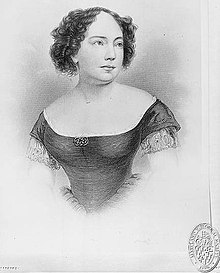Anna Ella Carroll
| Anna Ella Carroll | |
|---|---|

Anna Ella Carroll, 1815–1894
|
|
| Born |
Anna Ella Carroll August 29, 1815 near Pocomoke City, Maryland |
| Died | February 19, 1894 (aged 78) Washington, D.C. |
| Cause of death | Bright's disease |
| Resting place | Old Trinity Church, Church Creek, Maryland |
| Occupation | Pamphleteer and advisor to President Abraham Lincoln |
| Parent(s) | Thomas King Carroll and Julianna Stevenson |
Anna Ella Carroll (August 29, 1815 – February 19, 1894) was an American politician, pamphleteer and lobbyist. She was born in to a very wealthy family: her grandfather was one of the signers of the Declaration of Independence, her father was the governor of Maryland from 1830-1831, and her mother was the daughter of a Baltimore physician. She was also the eldest of eight children. She played a significant role as an adviser to the Lincoln cabinet during the American Civil War. She also wrote many pamphlets criticizing slavery. She died on February 19, 1894 at the age of 79.
Anna Carroll was born in 1815 on the Eastern Shore of Maryland into a prominent upper-class, religiously mixed Catholic-Protestant family. Her father was Thomas King Carroll, a planter who served as Maryland governor in 1830; he owned a 2,000-acre (8.1 km2) tobacco plantation in Somerset County. The eldest of eight children, Anna was educated and trained by her father to be his aide. She was likely tutored in the law by him. This allowed her access into the male world of politics.
Anna contributed to her family's income by establishing a girls' school at their home of Kingston Hall. Little is known about her life between the ages of twenty and thirty-five.
Carroll entered the national political arena in the 1850s, following her father's appointment as Naval Officer for the District of Baltimore by Whig President Zachary Taylor. Shortly thereafter, Taylor died and Carroll's commission was signed by Millard Fillmore. In 1854, Carroll joined the American Party (the Know Nothing Party) following the demise of the Whigs. At the time much political realignment was going on nationwide. The same year the Republican Party was formed. The Southern pro-slavery Democrats took over control of their party's leadership in Congress due to the defeat of many Northern Democrats following the passage of the unpopular Kansas–Nebraska Act in May.
In Maryland, large numbers of immigrants, largely Irish and German Catholics, had flooded into Baltimore during the Great Famine in Ireland and the 1848 Revolutions in Germany. They took work in the port and railroad yards. Due to this rapid increase in population density, there was competition with free people of color for housing and jobs; street crime became a problem and relief rolls rose. At the same time, planters were a strong force in the state; many Catholic and Episcopalian planters resided on the Eastern Shore, which continued as primarily agricultural. In 1853, the Maryland Know Nothing party was formed, initially from three nativist groups. Yet beginning in February, it took in large numbers of striking laborers from the ironwork's factory in Baltimore, whom the Democratic Party had refused to support. In opposing the pro-slavery Democrats, the Know Nothings became a powerful, but divisive, party in the state. They were pro-Union, pro-labor, anti-Catholic, and anti-immigrant.
...
Wikipedia
